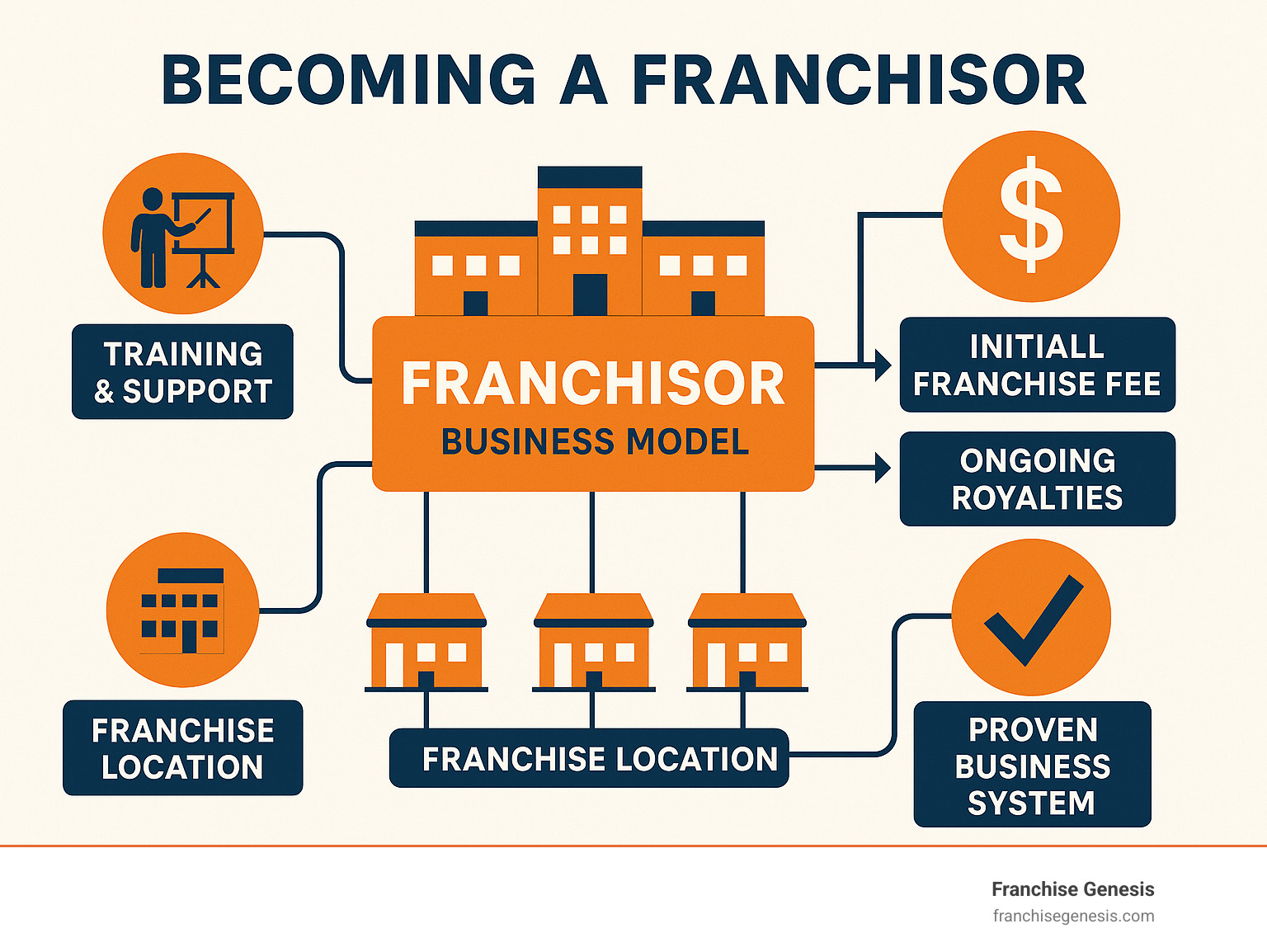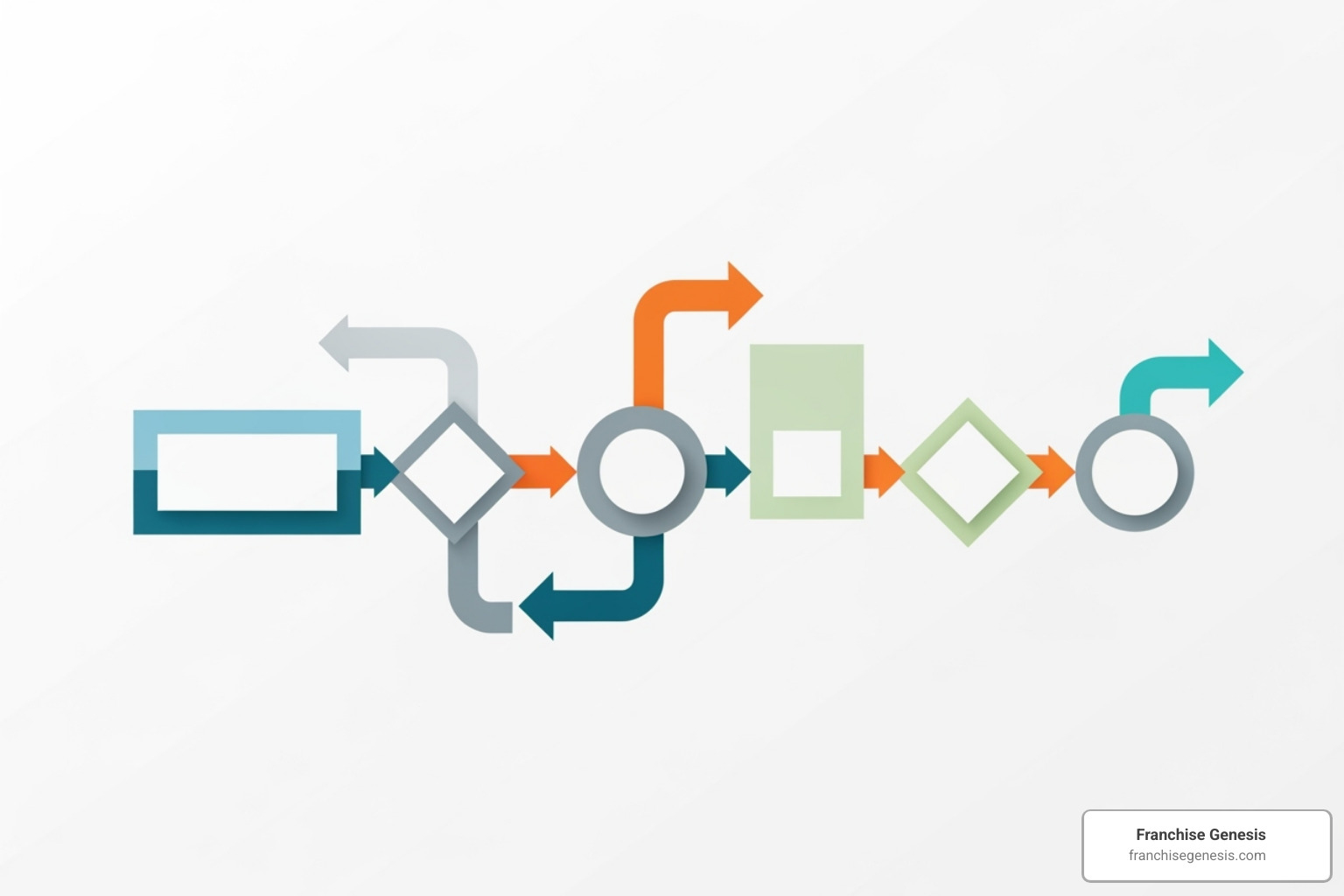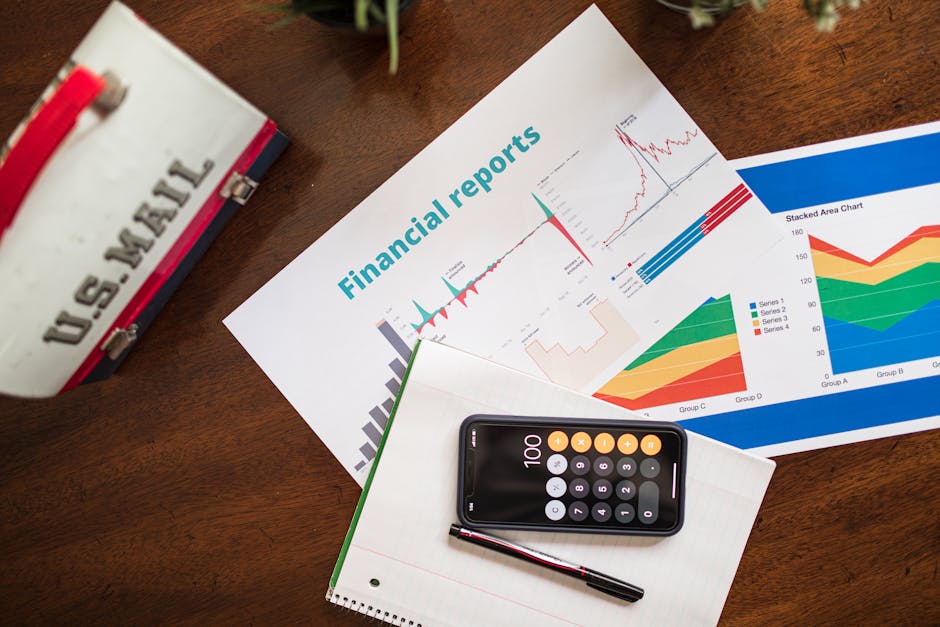Why Becoming a Franchisor is the Smart Growth Strategy for Your Business
Becoming a franchisor can transform your successful local business into a thriving national brand. The U.S. franchising industry is a powerhouse, contributing over $860 billion to the economy and proving that almost any business can be franchised if properly structured.
Quick Answer: Essential Steps to Becoming a Franchisor:
- Evaluate readiness – Ensure your business has proven profitability and a replicable model.
- Develop franchise structure – Create an operations manual, fee structure, and territory rights.
- Handle legal requirements – Prepare a Franchise Disclosure Document (FDD) and franchise agreements.
- Create marketing strategy – Build a franchisee recruitment plan and brand positioning.
- Launch and support – Select the first franchisees and provide ongoing training and support.
The process typically takes 90-120 days and costs between $18,500-$84,500, depending on complexity.
But here’s what many business owners don’t realize: franchising isn’t just about expansion—it’s about creating a systematic approach to growth that reduces your capital investment while leveraging other people’s resources and local market knowledge.
As one successful franchisor shared: “We started with one clinic and, with the help of a franchise program, sold over 190 clinics in less than three years.” This kind of rapid, capital-efficient growth is exactly what makes franchising so attractive.
I’m Monique Pelle-Kunkle, Vice President of Operations at Franchise Genesis, where I’ve guided dozens of business owners through the process of becoming a franchisor. My experience includes scaling an ABA therapy franchise to over 100 locations within its first year, demonstrating the incredible growth potential when franchising is done right.

Easy Becoming a franchisor glossary:
Is Your Business Ready for Franchising?

Picture this: you’ve built a successful business, and now you’re wondering if it could be the next big franchise. It’s an exciting possibility, but becoming a franchisor requires more than just profitability—it needs a solid foundation.
Can someone else follow your recipe and create the same magic? That’s the essence of franchising readiness. Your business needs to tick several important boxes. You need a replicable business model that doesn’t rely on your personal touch. If customers come specifically for you, you’ll need to bottle that expertise into teachable systems.
Proven profitability is non-negotiable. You need consistent financial performance that shows your model works reliably, giving potential franchisees confidence they’re investing in something solid.
Scalability is also crucial. Your operations must work whether you have one location or fifty. If your current systems would crumble under expansion, it’s time to strengthen them first.
A strong brand identity helps too. Customers should recognize and trust your brand, giving new franchisees an immediate advantage. Finally, there must be genuine market demand for what you offer, not just in your hometown but in other communities.
Most importantly, your operations need to be standardized. Every process should be documented and teachable to ensure consistency across all locations.
Learn more about Why You Should Franchise to explore the full potential of this growth strategy.
Key Requirements for Becoming a Franchisor
Becoming a franchisor isn’t just about having a great business—it’s about having a great system that others can run. Here’s what we look for when evaluating franchise readiness.
- Distinctive Brand: Your brand should represent a consistent customer experience that people trust. Think of familiar franchise brands—you know what to expect, whether you’re in New York or Nashville.
- Consistent Financial Performance: Sustained profitability over several years proves your model isn’t a fluke and that franchisees can expect reasonable returns.
- Teachable System: Your success must be transferable through clear, step-by-step procedures. If your business thrives on intuition, you’ll need to systematize those elements.
- Adequate Capital: While franchisees fund their locations, you need resources to build the franchise system itself, covering legal fees, training materials, and marketing.
- Leadership Personality Shift: You must transition from a hands-on operator to a coach and mentor, supporting independent business owners while maintaining brand standards.
This change is essential for franchise success. Our guide on From Business to Franchise Conversion explores this journey in detail.
The Main Advantages and Disadvantages
Every growth strategy has trade-offs, and becoming a franchisor is no exception. Let’s look at both sides honestly.
| Advantages of Franchising | Disadvantages of Franchising |
|---|---|
| Rapid expansion with less capital, as franchisees fund their own locations. | Less direct control over daily operations and customer experience. |
| Lower capital outlay for growth, allowing you to focus on support. | Shared profits through fees and royalties instead of total profit. |
| Motivated owners who are personally invested in their success. | Complex regulations requiring strict legal compliance and documentation. |
| Ongoing royalty fees providing steady, recurring revenue streams. | Potential brand damage from underperforming or non-compliant franchisees. |
The advantages are compelling. Rapid expansion lets you grow your brand footprint quickly. You benefit from motivated owners with skin in the game and create predictable revenue through ongoing royalty fees.
However, the disadvantages are real. Less control can be challenging for hands-on owners. You’re sharing profits, and the complex regulations require diligence. Most importantly, potential brand damage from one bad location can impact the entire network.
Successful franchising requires a different mindset. You’re building a network of partners, not managing employees.
Want to learn more about creating this kind of thriving network? Check out Understanding the Key to Building a Thriving Franchise Network for deeper insights into franchise success.
Your Step-by-Step Roadmap to Becoming a Franchisor
Here’s the truth about becoming a franchisor: it’s a process that requires following a proven roadmap. Think of it like building a house—you need a solid foundation, a clear blueprint, and the right team.
The entire franchise development process typically takes between 90 to 120 days to become legally able to sell franchises. When broken down into manageable steps—strategic planning, legal framework, operations development, and marketing—it becomes much more achievable.

What makes this timeline realistic is having the right guidance. The key is starting with a systematic approach that minimizes risks while maximizing your potential for scalable growth.
Ready to dive into the details? Our Franchising Business Complete Guide gives you the complete picture of what’s ahead.
Step 1: Develop Your Franchise Structure and Operations Manual
This is where your business’s secret sauce gets transformed into a replicable system. Your franchise structure is the blueprint of your network, defining your franchise fees, royalty structure, and territory rights.
However, your operations manual is the most critical piece. It’s the DNA of your business in writing. Think about McDonald’s—whether you’re in Miami or Milan, you know what to expect. That consistency comes from detailed, documented systems.
Your operations manual is a multi-purpose tool:
- A sales tool showing prospects the professionalism of your system.
- A training guide for onboarding new franchisees and their staff.
- A reference guide for day-to-day operations.
- A quality control device that ensures brand consistency and protects you legally.
The manual covers everything from training programs to support systems, all designed to empower franchisees to replicate your success. We’ll help you document every process so someone new to your industry can follow your blueprint and succeed.
This work is detailed but critical. Learn more about creating a robust Franchise Operations Manual.
Step 2: Create Your Franchise Sales and Marketing Plan
Once your business is structured for franchising, it’s time to attract the right people. This is about magnetic marketing that draws in qualified, passionate franchisees who align with your vision.
First, we help you define your ideal franchisee profile. Who are they? What skills and drives do they have? Understanding this helps us target our efforts effectively.
Next, we craft your brand story and value proposition. This isn’t a generic pitch; it’s about what makes your franchise unique and how it can improve someone’s life, whether through flexibility, community impact, or financial potential.
Your marketing plan will include strategic lead generation channels to reach candidates where they’re looking, such as:
- Online Portals: Reputable sites where serious franchise seekers browse.
- Public Relations: Media attention and positive stories build credibility.
- Social Media Marketing: Build an engaged community on platforms like LinkedIn.
- Broker Networks: Experienced professionals who connect qualified candidates with opportunities.
- Franchise Trade Shows: Face-to-face opportunities to showcase your brand.
Every campaign should drive prospects to a dedicated franchise recruitment landing page. The key is starting early to develop your brand story and value proposition. Dive deeper into Franchise Sales & Marketing to see how we approach this critical step.
Step 3: Find and Select the Right Franchisees
Choosing the right franchisees is critical to your network’s success. They are partners whose performance directly impacts your brand’s reputation and growth.
We use a rigorous screening process to ensure a mutual fit. It starts with an application review, where we gather details on their background and financial capacity. The interview process involves in-depth conversations to assess their motivations and alignment with your brand values.
Financial verification ensures they have the necessary capital to invest and sustain themselves during the start-up phase. We also facilitate franchisee validation calls, where prospects speak directly with your existing franchisees for unbiased insight. This is often your most powerful sales tool.
The process culminates with Findy Day, typically held at your headquarters. Qualified candidates meet your team, experience your operations, and immerse themselves in your brand’s culture. It’s your final chance to assess their engagement and cultural fit.
Throughout this process, we look for people with passion, financial capacity, and the right work ethic. Taking the time to choose wisely sets the foundation for a thriving franchise network. The goal is to Transform Leads into Loyal Franchisees with a Proven Sales Strategy.
Navigating the Legal and Financial Landscape
Let’s be honest—the legal and financial side of becoming a franchisor can feel overwhelming. But this isn’t just red tape. These frameworks are your safety net, protecting both you and your future franchisees while building a rock-solid foundation for growth.
In the United States, franchising is regulated at the federal level by the Federal Trade Commission (FTC) Franchise Rule. This rule focuses on transparency and fair dealing, ensuring that when someone invests in your franchise, they know exactly what they’re getting into. Many states also have their own franchise laws that add further requirements.
The financial planning piece is equally crucial. You need to understand the costs to set up your system and how to protect your intellectual property—your brand and processes. With the right guidance, it becomes a manageable part of your expansion journey.

Ready to tackle the legal landscape? Our comprehensive Guide to Franchising breaks down everything you need to know.
Essential Legal Documents and Registrations
These documents are the backbone of your franchise relationship, clearly defining roles and protecting everyone involved.
- Franchise Disclosure Document (FDD): This is your most important legal document. The FTC requires you to provide this to potential franchisees at least 14 days before they sign anything or pay money. The FDD covers your company’s history, fees, legal issues, and mutual obligations. Understanding [What is a Franchise Disclosure Document?](https://www.investopedia.com/terms/f/franchise-disclosure-document.asp#:~:text=Thefranchisedisclosuredocument(FDD,tomakeasignificantinvestment.) is absolutely essential.
- Franchise Agreement: This is the binding contract that details the terms of your relationship, including territory rights, agreement length, payment schedules, and operational standards.
- Trademark Registration: Your business name, logo, and distinctive marks must be registered with the U.S. Patent and Trademark Office (USPTO). Without this, you’re building a brand that anyone could copy.
- Separate Legal Entity: We strongly recommend establishing a new corporation for your franchising activities. This separates your original business from franchise operations, simplifying accounting and managing liability.
Working with an experienced franchise lawyer is essential to ensure compliance and protect your interests. For deeper insights, check out our FDD Document guide.
The Financial Realities of Becoming a Franchisor
What does it actually cost to transform your business into a franchise system? While franchising is capital-efficient for expansion, there are real upfront costs. The total investment for becoming a franchisor typically ranges from $18,500 to $84,500, depending on your business complexity.
Key expenses include:
- Legal Fees: Your biggest initial expense, covering the creation of a compliant FDD and franchise agreement.
- Operations Manual Development: Translating your knowledge into a professional, comprehensive training tool.
- Trademark Registration: Fees paid to the USPTO to protect your brand identity.
- Audited Financial Statements: Required for your FDD, adding accounting expenses.
- Franchise Marketing Infrastructure: Developing a website, marketing materials, and advertising campaigns.
- Training and Support Systems: The infrastructure and staff needed to support franchisees from day one.
These expenses are investments in your future growth, not just costs. With a 90 to 120-day development process, you can start seeing returns from franchise fees and royalties relatively quickly. Learn more about Franchise Startup Costs and find various Franchise Financing Options Complete Guide to support your journey.
Frequently Asked Questions about Becoming a Franchisor
I get these questions all the time from business owners curious about franchising. Here are the answers to the most common concerns.
How long does it take to franchise a business?
Becoming a franchisor typically takes between 90 to 120 days. The timeline depends on your preparedness. If your financial records and operations are well-organized, the process can be faster. The key phases are legal documentation (which takes the most time), operations manual development, and creating your marketing and support systems. The better prepared you are, the smoother the process will be.
Can any business be franchised?
Almost any successful business can be franchised. The key is having a business that is:
- Profitable and Proven: You need a track record of consistent financial performance.
- Replicable and Teachable: Your success cannot depend entirely on your unique, personal skills. It must be a system that others can learn and follow.
- In Demand: Your brand must have strong recognition and market demand for its products or services.
The common thread isn’t the industry—it’s having standardized systems that produce consistent results. If you can document your process so someone else can replicate your success, your business can likely be franchised.
What are my ongoing responsibilities as a franchisor?
Becoming a franchisor fundamentally changes your role. You become the leader of a network, with continuous responsibilities.
Your most important job is providing training and support, both initially and on an ongoing basis. You are also responsible for brand management and marketing support, coordinating campaigns and ensuring consistency across all locations.
You’ll provide operational guidance, acting as a business coach and mentor to your franchisees. Finally, you must foster collaborative relationships within your network, creating a sense of community and shared purpose.
It’s a big shift from being a hands-on operator to a leader, but it’s incredibly rewarding to watch your franchisees succeed. Learn more about how we help with Franchise Training & Success to make this transition smoother.
Conclusion
Becoming a franchisor represents one of the most exciting growth opportunities available to successful business owners. We’ve explored the entire journey, from evaluating your business’s readiness to navigating the legal and financial requirements.
The franchising industry is a cornerstone of the economy, creating success stories year after year. Its power lies in its unique model: you partner with motivated entrepreneurs who invest their own capital and local knowledge to grow your brand.
But remember this: becoming a franchisor is about more than just expansion or royalty income. It’s about creating a legacy that extends far beyond what you could achieve alone. You’re building a network of business owners who share your vision, spreading your brand’s impact across new communities.
The process requires dedication, a solid operational blueprint, and an unwavering commitment to supporting your franchisees. With the right partner guiding you, what seems overwhelming becomes entirely manageable.
At Franchise Genesis, we’ve seen countless business owners transform their local successes into thriving national brands. The journey typically takes 90 to 120 days, but the rewards can last a lifetime. We’re here to help you Franchise Your Business the right way—with expertise, support, and a genuine commitment to your success.
Your successful business already has what it takes. Now it’s time to share it with the world.
